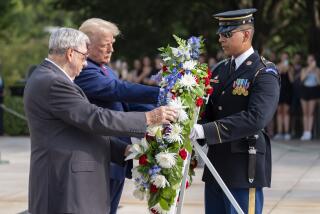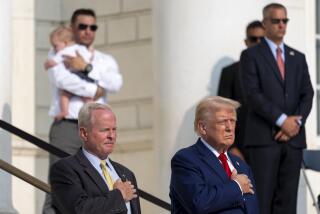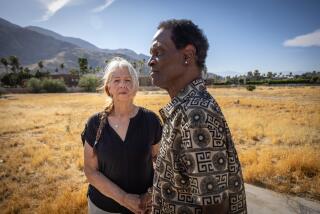Idaho Navy veteran has one goal — to be interred beside her wife
- Share via
Reporting from BOISE, Idaho — Leaning on a sturdy walker for support, Madelynn Lee Taylor walked into the office of the Idaho State Veterans Cemetery with one simple goal.
Taylor is 74 years old, a veteran, widow and church deacon. She wanted to register for a niche in the columbarium, wanted her service to her country honored, her marriage vows celebrated.
But the seven words she uttered after “I need paperwork to fill out for reservations” rendered the spare earth-tone lobby momentarily silent. “This,” she said, “is for me and my wife.”
The clerk summoned her supervisor. Apologies all around. The military cemetery is run by the state, they told Taylor, and Idaho’s Constitution bans same-sex marriage. We must, they said, follow state law.
Taylor turned around. Walked back out. And began to boil.
Today, the Navy veteran, who enlisted for two tours of duty, is a little closer to her goal because on May 13, federal Chief Magistrate Judge Candy Wagahoff Dale declared the Idaho marriage ban unconstitutional.
The Gem State’s prohibition is among the most severe in the country, outlawing same-sex marriage, civil unions and domestic partnerships — any relationship, legislators here said in early descriptions of the ban, that “attempts to approximate marriage.” It also forbids state agencies from recognizing out-of-state marriages such as Taylor’s.
Republican Gov. C.L. “Butch” Otter has appealed Dale’s decision and wants the ban to remain in place at least until his appeal can be heard. A three-judge panel of the U.S. 9th Circuit Court of Appeals has agreed — for now.
And the ashes of Jean Francis Mixner, beloved wife, remain in a box in Taylor’s bedroom closet, where the newly minted activist talks to them each evening. One recent topic of conversation: Taylor’s fight to become the first female veteran interred in Idaho’s military cemetery with her wife.
“I just asked her if she’s with me,” Taylor said. “She said, ‘Yes. Go for it.’”
Taylor enlisted in 1958. She was 18 and her mother had recently given birth to her younger sister, Kathy. The medical bills were steep. Taylor knew there would be no money for college, “and I liked the dress blues.”
Her first tour of duty ended in 1961, and she immediately re-upped. But at Naval Air Station Corpus Christi, Texas, everything began to unravel.
A female recruit wanted out of the service, Taylor said, and told commanding officers she was a lesbian. She named other women as well, Taylor among them.
It was 1964, long before rainbow flags and pride parades. Taylor was offered a court-martial or an undesirable discharge. She chose the latter.
A decade or so later, the Navy changed its policy, allowing those kicked out because of their sexual orientation to apply for honorable discharges so they could receive full military benefits. In 1979, Taylor became a veteran in good standing.
Taylor and Mixner met on a blind date in Kansas City, Mo., in 1995, and “she just knocked me over, right there,” Taylor said. “I was 55, so she was 49, six years’ difference. Big blue eyes behind glasses. We spent the whole night playing gay trivia games.”
A year later, at a church retreat, they were joined in a holy union ceremony wearing matching plaid blazers. In 2008, while visiting Taylor’s brother in Needles, Calif., they were legally married three weeks before state voters passed Proposition 8.
Mixner had been diagnosed with emphysema early in the women’s relationship. By 2011, she needed around-the-clock care. The morphine she was administered made her confused and prone to wandering off.
“She’d been getting sicker and sicker and wandering more, so I put an alarm on her bed,” Taylor said. “When she got out of bed, it rang an alarm and woke me.”
One night their dog had soiled their new bedspread. So Taylor changed the linens, put her wife to bed, put the dirty laundry in the washing machine and sat down to watch television.
She fell asleep in the recliner. She had forgotten to set the alarm. Mixner’s body was found in a neighbor’s flower bed. It was April 19, 2012.
“Jean and I had promised each other we’d be buried together,” Taylor said. “If there’s a next life, we’re going to arrange to be next-door neighbors from the age of 2. It’s a special request to the Boss.”
It never occurred to Taylor they could not be interred at the Idaho State Veterans Cemetery.
Six months earlier, the federal government had granted permission for a same-sex couple to be buried in a national cemetery in Oregon. But Idaho doesn’t have a national cemetery, and state burial grounds are still governed by the marriage ban.
“I really couldn’t see how the ashes of two old lesbians were going to hurt anybody,” she said. “The crypt is 20 inches deep. I’m going to take up just the front half of it, for heaven’s sake. And I’ve got to pay $700 for her to take up the back half.”
Taylor burst into a wheezy laugh when asked what she and Mixner could possibly do from deep within the columbarium walls. She paused. Laughed again. “Recruit!”
Taylor’s struggle with the veterans cemetery here has turned her into a septuagenarian cause celebre as well as an activist.
She’s joined a campaign called “Add the 4 Words,” which is pushing to add “sexual orientation” and “gender identity” to the state’s antidiscrimination law. She has been arrested three times during demonstrations at the Capitol.
On a recent afternoon, the wind whispered across manicured grounds of the Idaho State Veterans Cemetery. Bright spring sunshine gleamed off the gray granite markers on five long banks of funeral niches.
Taylor walked slowly along the columbarium wall, her cane tapping in the quiet, pointing out plaques that celebrate both military service and wedding vows. Richard Fielding Henry and Joanne, Steve Rogers and Kathryn, Forest R. Shaw and Shirley J.
“There’s another one over there,” she said, sounding both wistful and indignant. She read aloud: “Mitchell. Virgil Donald. TEC 5 U.S. Army World War II. 1920-2009. Together Forever. Laura 1923-2012.”
She talked about her cousin Kenny, lost to AIDS in the early years of the epidemic. And Great-Uncle Tom, a gay man who lived and died long before marriage equality was a concept, let alone a reachable goal.
And she envisioned what another marker might say, sometime in the not-so-distant future: Taylor, Madelynn Lee. TD 3, U.S. Navy, 1940-XXXX. Together forever. Jean Mixner, 1946-2012.
“Together forever. That’s what I want ours to say.”
More to Read
Sign up for Essential California
The most important California stories and recommendations in your inbox every morning.
You may occasionally receive promotional content from the Los Angeles Times.











